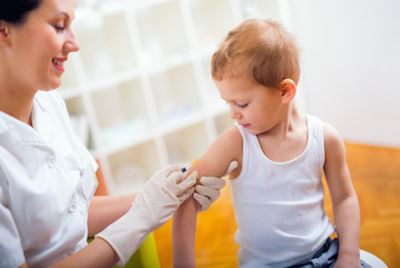One easy thing you can do to help prevent ear infections
Ear infections are one of the most common medical problems children experience within the first three years of life. They are upsetting and painful for the child, and they often result in frustration and sleepless nights for the whole family. In other words, parents would prefer to avoid ear infections if at all possible.
Since good news in the medical world is often skipped over without a glance, it’s worth taking a moment to celebrate the things that have been successful in helping our kids live happier, healthier lives. So here’s some good news about ear infections: the likelihood of your child suffering from an ear infection or from chronic problems related to ear infections is dramatically lower than it was 30 years ago.
In 1989, studies tell us that by their third birthday about 80 percent of kids had experienced at least one episode of acute otitis media, which is the technical name for an infection of the middle ear. About 40 percent of kids had suffered three or more bouts with otitis media by three years of age.
Current studies tell us that those numbers have dramatically declined. Now, about 60 percent of children will have at least one ear infection by three years of age, and only 24 percent will experience three or more episodes of illness during that time.
How a vaccine helps prevent ear infections
You may be thinking, “that’s great, but why have ear infections decreased so dramatically over the last few decades?”. While there are lots of variables that could be playing a role, there’s one thing that has likely had a huge influence: the pneumococcal vaccine (also known as PCV13).

A pneumococcal conjugate vaccine became available in 2000 (first available as a formulation known as PCV7 then reformulated as PCV13 in 2010). This vaccine protects people from various infections caused by the bacteria Streptococcus pneumoniae including pneumonia, meningitis and (you guessed it!) otitis media. PCV13 is now recommended as a routine vaccination for infants and toddlers, and the sharp decline of ear infections has coincided with the rise of the pneumococcal vaccine.
There are other types of bacteria that can cause ear infections, and we don’t have a vaccine for those yet (that’s why we still see otitis media occurring), but we’ve greatly reduced the number of infections due to Streptococcus pneumoniae, and that is a huge win for everyone.
What is perhaps the easiest thing you can do as a parent to help prevent your child suffering from debilitating ear infections? Get the PCV13 vaccine. Your pediatrician will offer it as part of your child’s routine immunizations in a four-part series given at 2, 4, and 6 months of age and a booster sometime between 12 to 15 months of age. Even if you opted for your child not to receive it during the recommended time frame, it’s not too late. Older children can receive the vaccine as well with a modified schedule.
Other factors that can affect a child’s chance of ear infections
Getting a routine vaccine is a very easy way to combat the difficult problem of ear infections, but there are other factors, too, that can influence your child’s chances of suffering from otitis media.
 Children who are white and male are more likely than others to suffer from otitis media, as are children who have siblings in the home, a family history of ear infections, or who suffer from allergies, asthma or eczema. While this is helpful information to note, unfortunately these aren’t things that we as parents can change.
Children who are white and male are more likely than others to suffer from otitis media, as are children who have siblings in the home, a family history of ear infections, or who suffer from allergies, asthma or eczema. While this is helpful information to note, unfortunately these aren’t things that we as parents can change.
There are some significant variables, though, that we may be able to change that could have a big impact. We know that children who are breastfed for at least 50% of the time up until six months of age get ear infections less often than those who aren’t breastfed. We also know that children who attend daycare are much more likely to suffer from ear infections. And we know that the earlier in life a child gets an ear infection, the more likely they are to get multiple ear infections down the road.
While every family’s situation is unique, there may be some things you can do to help prevent ear infections. You might choose to breastfeed your child or extend breastfeeding longer than you may have originally planned to offer added benefit. You may wish to find private childcare instead of daycare if finances allow in order to minimize your child’s exposure to other children and frequent illnesses. Even if you can’t sustain these changes for an indefinite time period, extending these safeguards even a few months or throughout your baby’s first year could make a big difference.
And don’t forget, be sure to get the PCV13 vaccine. It’s the easiest thing you can do to help prevent ear infections.







